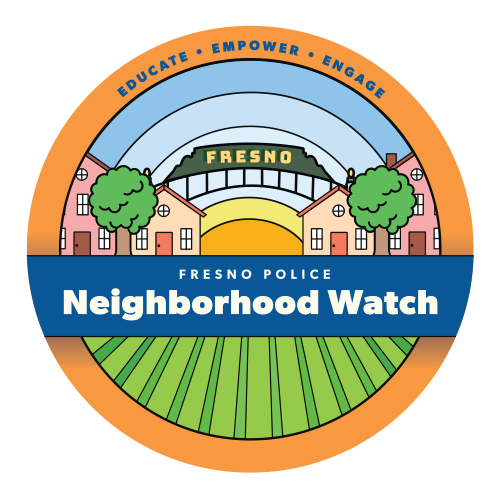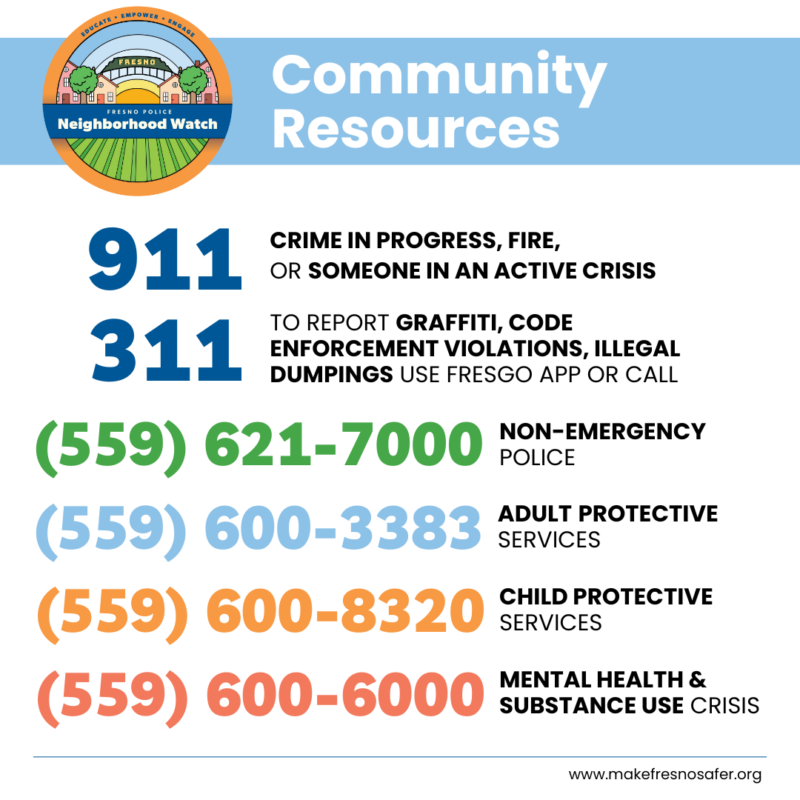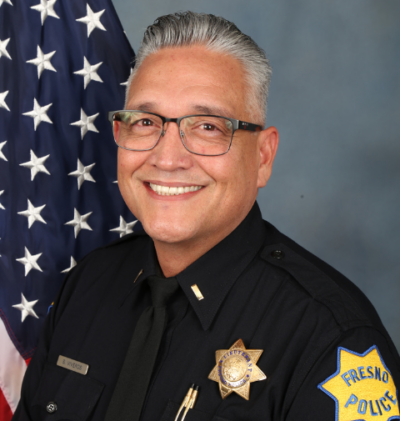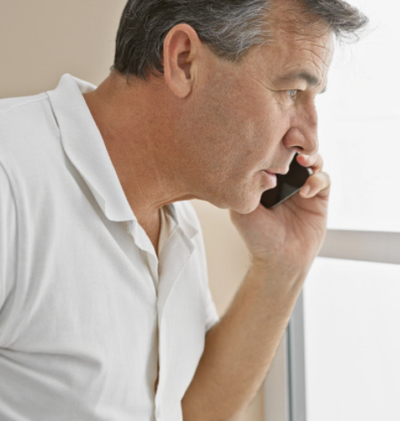Neighborhood Watch works by having you and your neighbors use simple techniques to deter and prevent crime, and to improve the quality of life for the neighborhood. A connected neighborhood is a safer neighborhood.
Promptly report all criminal or suspicious activity to the Fresno Police Department at 559-621-7000. Please call 911 to report a crime in progress. This helps the police to assist you in promoting a safe and healthy neighborhood. You can remain anonymous by calling Crimestoppers.
(559) 498-STOP or report online www.valleycrimestoppers.org
Our focus is to:
EDUCATE you about:
- Crime prevention techniques and strategies.
- Implementation of home security improvements.
- How to be a diligent witness.
- How and when to communicate with Police, the City or Code enforcement.
EMPOWER you to:
- become acquainted with your neighbors.
- build an internal communication system within your neighborhood.
- participate in your Neighborhood Watch program.
ENGAGE you by:
- Helping the police by being aware of and report any suspicious activities in the area.
- To maintain and improve communications between you and the Police Department by building
- a trusted relationship.
- Calling other city agencies as needed.
#1 Sign up for interest here.
Once completed, you will be on your way to making your neighborhood safer which is exciting! If you don’t want to be the Block Captain, no worries. We will, however, ask for your help to get the first meeting off the ground. You or anyone in the neighborhood can be designated the block captain. We recommend Co-Captains. The Block Captains are the liaison between the residents of the area and the Police Department. The meeting can be held at your residence or a location of your choice.
#2 Talk with your immediate neighbors next door and on your street. Let them know you are interested in starting or joining a group in the area. Ask them if they would like to participate. Gather their contact info: name, address, phone number and email. You can download and print this form to use. (link to form)
This information will be helpful for neighborhood communication.
#3 We will collaborate with you to set up your first neighborhood meeting. We highly suggest a front yard or driveway. We will invite neighbors to bring their own chairs so don’t worry about seating. We need to select a date and time. Wednesday evenings work best for Police Department staffing but if another day and time works best for your neighbors, we will schedule when it is best for your neighborhood. We can also set up a hybrid meeting and offer neighbors the chance to join online if they prefer.
#4 Once we have locked in a date, time and location, flyers will be created for you and your neighbors to pass out to your neighborhood. This is a great way to meet more neighbors and start connecting.
#5 You and/or another neighbor will host the location. Most times neighbors are happy to pitch in with snacks and drinks. A front yard location is welcoming and encourages neighbors to join the meeting. If there is anything we can do to assist, let us know.
#6 Depending on any issues you are experiencing in your neighborhood, we will periodically check in. You will also automatically receive announcements for safety tips and special events throughout the year.
We look forward to working with you and your neighbors to increase the safety of your neighborhood.
Thank you for being part of the solution!
A Good Neighbor Network is a group of caring and concerned neighbors who are invested in the safety and maintenance of their neighborhood. The Network develops healthy communication among neighbors in various methods. Older neighbors are used to a phone call or visit, and younger generations are tech savvy. This presents challenges when only using one method to communicate. Consider your neighbors and their needs. Your neighborhood may need to utilize more than one way to communicate (visit, phone call, text, email or mobile app.) Perhaps younger neighbors can “adopt” an elder in their neighborhood to make sure they are aware of announcements or alerts. Building connections develops relationships that can form friendships. Through that process, neighbors will naturally look out for each other.
Be mindful of things that look out of place and/or unfamiliar in your neighborhood. When you see a stranger, what do you ask yourself? Assess before you assume. Be mindful of bias. Be compassionate and fair. Pay attention long enough to determine whether they are a legitimate visitor/passerby or someone in suspicious behavior. Be part of a positive solution not the problem. Communicate these things with neighbors and call the Police if necessary. Learning low level strategies through Neighborhood Watch presentations and Block Captain workshops will help your neighborhood develop your own Good Neighbor Network.
If you have witnessed or are witnessing a crime in progress, try to remain calm and remember the most important detail is LOCATION. The more information gathered and disseminated quickly, the better chance police have of preventing further injury, property loss and catching the suspects or person(s) responsible. The last thing the police department wants is for anyone to put themselves in danger while a crime is occurring. However, if you do call to report a crime you will be asked several questions. The following tips will help you to be a good witness:
- Location, Location, Location. If you don’t know the exact address, try to find a street name, or closest intersection. Landmarks are good for most dispatch staff as well.
- What happened? Was it a crime or an accident? We will ask direct questions to try and ascertain what the officers will be dealing with at the scene.
- Is anyone injured? Is medical assistance necessary?
- Are/were any weapons involved? If so, what kind of weapon(s)? Where is the weapon now?
- Is the suspect still there? Is he/she still in the area? Who is the suspect? What do they look like? The dispatcher will prompt you for a general physical description such as race, height, weight, hair color and clothing the suspect is wearing.
- If the suspect left, try to get a direction of travel. Did they leave on foot or in a vehicle? If they left in a vehicle, try to get a description of the vehicle (ie. color, make, model, body style and license plate). Be sure to note if there was anything unusual about the vehicle (ie. camper, bumper stickers, broken windshield, tinted windows, etc.)
When you call the Fresno Police Non-Emergency line at 559-621-7000 or 9-1-1 during an emergency, you speak with one of a handful of dispatchers for the Fresno Police Department tasked with the enormous and underrated job of answering almost one million calls for service per year in the City of Fresno. Our emergency services dispatchers, who were added to the ranks of First Responders on September 11, 2020, under Assembly Bill 1945, were officially recognized by the State of California with this distinction. These dispatchers are broken up into groups with specific duties of receiving and relaying information to the appropriate parties.
When you make a non-emergency call for an issue, your issue is given a call priority based on the situation and several variables. Zero priority is reserved for emergencies with immediate need such as a threat to life or a crime in progress.
The next stage is a one-priority, meaning it is not an immediate emergency, however it is a high-priority call. These calls are responded to after all zero-priority calls have been handled. Your situation might be the worst thing that has happened to you and will be handled as soon as possible. However, it may not fit the one or zero-priority criteria at the time of your call.
For instance, if someone broke your car window and took something but has already left the scene and there is no immediate danger, this may be a two priority.
Do not be deterred from calling because you feel that it will take too long or not be handled. You can guarantee that the problem will surely not be handled if you never call. The Fresno Police Department relies on citizens to report crime in their neighborhoods, and we all must work together to make Fresno safer!
CALL THE POLICE WHEN:
You observe a crime in progress or about to happen
Notify the Police, Security, or Property Manager when:
You observe suspicious-acting person or vehicle
When to call the city or use the FresGO app:
- Illegal Dumping/Litter
- Illegal Firework activity
- Graffiti
- Code Enforcement
- Parking Issues
- Street concerns – lighting, trees, etc.
- Traffic – signals, signs, roadway paint
- Potholes
- Homeless Encampments
- For City, call 3-1-1.
Online Reporting
Use this form to report:
- Custody Order Violation
- Fraud and Identity Theft
- Harassing Phone Calls – excluding threats of imminent harm or death
- Hit & Run – Property damage only
- Lost Property
- Theft – Except motor vehicles and license plates
- Supplemental Property Form – Add additional property to your original case number
- Vandalism – Excluding graffiti
- Vehicle Burglary
More Neighborhood Safety Tips
Join The Mailing List





